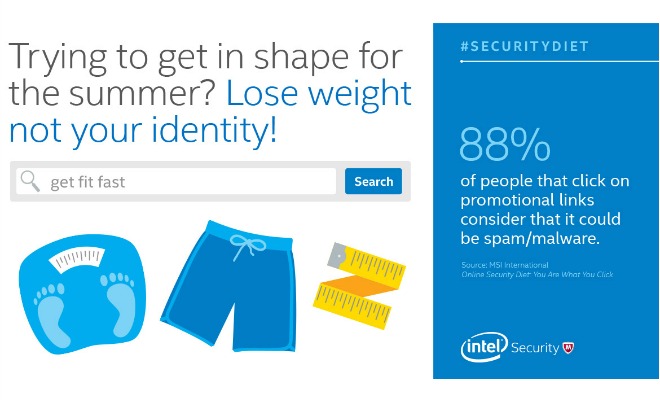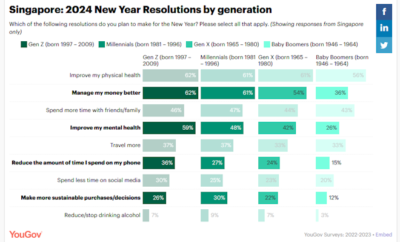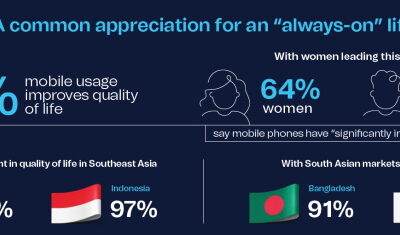
Insights + interviews
Think Twice Before Clicking On That “Weight Loss” Promotional Link
Intel Security recently conducted a Security Diet Survey to understand what Singaporeans looked up online when it comes to the topic of dieting.
Many of us seek to find answers to questions such as “how do you lose belly fat?” or “Can I sustain my weight loss?” and would most likely have clicked on a promotional link for dieting programmes, products or tips at least once before.
To better understand our online behaviour when it comes to this topic, Intel Security conducted a Security Diet Survey earlier in April 2016. The survey was conducted in multiple countries on over 15,000 people aged 21 to 54, with 1,200 of the responses coming from Singaporeans.
The results revealed some interesting insights that many of us can relate to:
- 54 percent of Singaporeans have clicked on a promotional link for dieting programmes/products/tips
- Of those that have not, 39 percent say they would click on such links
- 21 percent say they would most likely click on such links just before a holiday
- 64 percent of Singaporeans say they have clicked on promotional links that offer to help them lose weight
- Most people stay up to date on the latest in weight, health, and body issues through online research (41 percent), social media (41 percent), health blogs or websites (38 percent), or magazines (31 percent)
Some promotional links that people are most likely to click on are:
- Lose that belly fat – 35 percent
- Diets that work – 34 percent
- Juice cleanse – 31 percent
- 10 best ways to lose 10 pounds – 28 percent
- 6-pack abs – 22 percent
- No sugar diet – 20 percent
- Before/after – how I lost 30 pounds in 30 days – 18 percent
The results also revealed that people do not place enough focus on security and trust. Many Singaporeans are not sure how to find out if a website is secure before sharing personal information:
- 1 out of 4 Singaporeans assume a site to be genuine if they see a promotional link
- 46 percent of Singaporeans do not know how to check if a website is secure before providing payment details or information
- 23 percent of Singaporeans have purchased a product or service from a promotional link before even knowing if it’s a secure site
This is not to say that every diet advertisement is out to cheat. There might be useful and legitimate information behind some of these health ads and fitness websites. Intel Security offers some tips that could help Singaporeans browse their diet and health content more responsibly:
Click with caution
Some offers such as “Lose 10 pounds in one week” may sound too good to be true, and they may be sites that should be viewed with caution. Some websites or emails might also include phishing links that can lead users to websites that lure them into giving personal information to cyber-criminals or downloading malware to their computer.
Browse safely
Phony sites aimed at scamming consumers may have an address that is very similar to a legitimate site. For instance, “Wait Watchers” as opposed to “Weight Watchers” – these phony sites often contain misspellings, poor grammar, or low-resolution images. When a site asks for personal information, be sure to double check the URL to verify that the site is not an imposter. Web reputation tools such as McAfee WebAdvisor can help identify risky sites and inform users before they enter the site.
Create strong passwords
Avoid using simple passwords such as “123321”, and opt for stronger ones such as “9&4yiw2pyqx#.” Users can also consider using a password manager to improve the quality of their passwords, or change their passwords regularly and avoid using the same passwords across all accounts.
Update security updates regularly
Users should aim to protect their computer with a good security software that updates automatically. This ensures that users are using the manufacturer’s latest operating system which allows security patches to be updated and routine scans to be conducted on an ongoing basis.
Use a comprehensive security solution
Users can help shield their devices from malware and other cyber-attacks by using a comprehensive security solution.
–
Intel Security encourages Singaporeans to lose weight not just in a safe and healthy way, but also in a secure way. For more information on security and the survey data, visit Intel Security.









